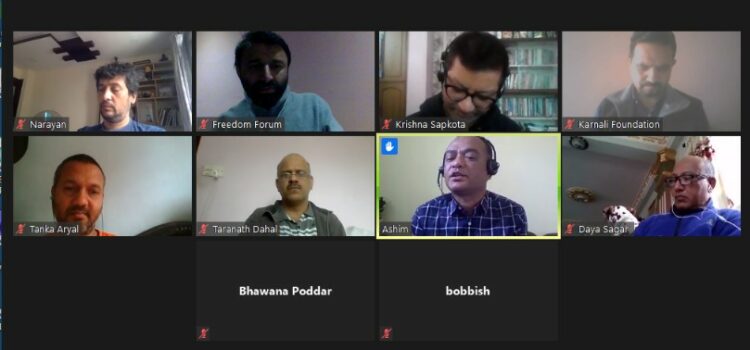The current COVID-19 pandemic is challenging for civil society too but it can offer new opportunities for them, states Executive Chief at Freedom Forum, Taranath Dahal. According to him, the watchdog and humanitarian role of civil society should be kept intact. The governance openness during the time of crisis and pandemic is more important than in normal situation. Hence, the issues of Open Government Partnership are not only the issue of CSOs but also of government. The public procurement policy and practice is not transparent and competitive as it needs to be at such time. Similarly, he stressed different pillars of OGP that should be practiced during the time of pandemic.
Policy and Legal Advisor of FHI360, Tanka Aryal, questioned about the fund raised by the government, which has not been utilized yet. He suggested that CSO along with the media and institutional mechanism should join hands in this crisis. The oversight, watchdog, and facilitation role of CSO is recognized to some extent in Nepal mainly in service delivery. Though, the government is not endorsing the co-creation role of CSOs.
Chair of the National Campaign for Sustainable Development, Dayasagar Shrestha, stressed that Covid-19 is not only a health related crisis, but it is a genuine threat for practicing democracy and governance. The pandemic is equally affecting the migrants’ workers, vulnerable and exclusionary groups. Although the government in Nepal formed a high-level coordination committee on control and preventionof COVID-19, it did not consult wider stakeholders while conducting meetings and making decision.
Policy Advisor at FF, Krishna Sapkota, stressed the need of freedom of association, freedom of assembly, and freedom of expression as necessary elements of current governance which obviously are major issues of OGP.
Open response and Open recovery has become core principles, the aim of co-creation in building trust and confidence during COVID-19. Open Budget Survey results have been decreasing the status of Nepal. Sapkota also mentioned access to information, open contracting, open budget, citizen engagement, and asset disclosure about COVID-19.
However, Country Manager at Saferworld Nepal, Ashim Pandey, underscored that we need to be self-critic as a CSO. We are quite confused on our role. Mainly, after the election and three tiers of government, CSOs are losing their visibility. Pre-election, the role of civil society was clear and visible in governance including service delivery. Today also, the public is expecting the same. He felt like post-election the role of CSO needed to be reframed. The co-creation agenda of OGP is still lacking somewhere. Therefore, we need to discuss it further even during the time of crisis.
Executive Director of Accountability Lab, Narayan Adhikari, focused on generation of synergy via OGP stakeholders. He also urged the flexibility among donors. Review of the existing policy framework of Nepal is needed in regards to OGP, accountability, and transparency, he added.
Executive Chief Mr Dahal concluded the meeting asserting that different policies were being made in different democratic countries in order to legally address the pandemic situation. However, in the context of Nepal, nothing such has happened. He urged that institutional mechanisms like NHRC, NIC need to be more active, we need to collaborate with them for better understanding and proper dissemination of the information in this situation.
The Zoom meeting was held on 29 May 2020 as the initiative of Freedom Forum initiatives. It was attended by 10 participants. Out of 10 participants, there were 2 females in the event.

